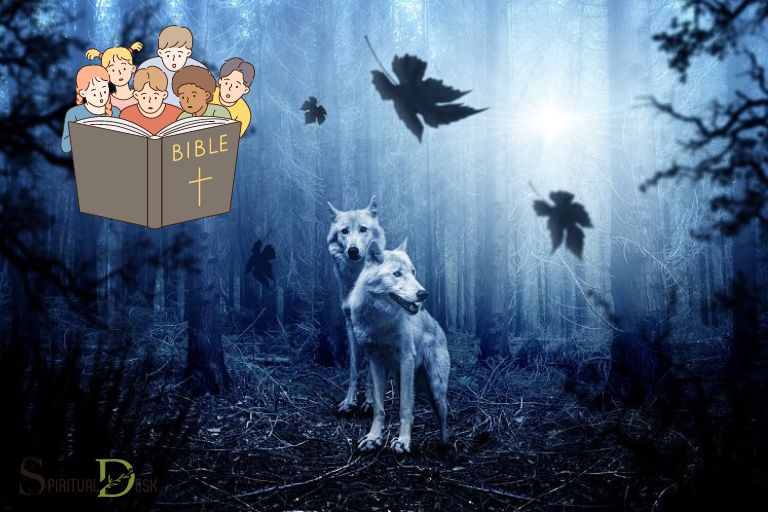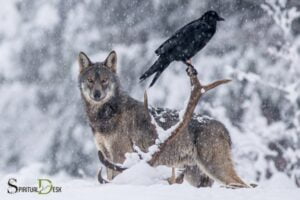Wolf Spiritual Meaning Bible: Destruction!
Wolf spiritual meaning in the Bible is often a symbol of destruction and devastation. Wolves represent violence, destruction, cunning, and danger to man�s soul.
In the Bible, God often uses symbols of destruction like the wolf to demonstrate his power and might.
The wolf is often depicted as a cunning and destructive force in the Bible, as in Matthew 7:15, where false prophets are likened to “wolves in sheep’s clothing.”
However, in a positive light, the wolf also embodies the qualities of diligence and guardianship, reflecting the animal’s behavior in the wild.
Key points on the wolf spiritual meaning in the Bible are:
The spiritual meaning of the wolf in the Bible is a representation of destruction, violence, danger, and evil.
It is a sign of how powerful God is and how he can still defeat the enemies of man�s souls.
The use of wolves in the Bible serves to remind us that God can protect us even in our most difficult moments.
5 Bible References About Spiritual Meaning of Wolf
| Bible Reference | Biblical Wolf Symbolism | Spiritual Meaning |
| Matthew 7:15 | “Beware of false prophets, which come to you in sheep’s clothing, but inwardly they are ravening wolves.” | Wolves here symbolize deceit and falsehood, suggesting that people should be vigilant and discerning. |
| Acts 20:29 | “I know that after I leave, savage wolves will come in among you and will not spare the flock.” | This metaphor suggests that there will be individuals who will try to cause division and destruction within the church or community. |
| Genesis 49:27 | “Benjamin shall ravin as a wolf: in the morning he shall devour the prey, and at night he shall divide the spoil.” | Wolves here might symbolize an aggressive or predatory nature, attributing these characteristics to the tribe of Benjamin. |
| Isaiah 11:6 | “The wolf also shall dwell with the lamb, and the leopard shall lie down with the kid; and the calf and the young lion and the fatling together; and a little child shall lead them.” | In this prophecy, the wolf symbolizes the transformation of the natural world during the peaceable Kingdom of the Messiah. Wolves and lambs living together suggest harmony and peace. |
| Zephaniah 3:3 | “Her princes within her are roaring lions; her judges are evening wolves; they gnaw not the bones till the morrow.” | The comparison of judges to wolves might suggest greed, corruption, and a lack of mercy or fairness. |
Key Takeaway

Five Facts About: Spiritual Meaning of Wolf in Bible
Understanding The Biblical Symbolism Of Wolves
The spiritual symbolism of wolves in the bible is an intriguing topic that invites exploration and understanding.
In biblical text, wolves often represent profound spiritual meanings that can evoke both awe and curiosity.
In this section, we will delve into the spiritual significance of wolves in the bible, their symbolic representations, and the relevance of wolf symbolism in biblical stories.
Spiritual Significance Of Wolves In Biblical Text
- Wolves are often associated with strength and power in the bible, representing the fierce and untamed nature of certain individuals or groups.
- The wolf’s presence in biblical passages highlights the importance and influence of leadership and authority.
- Wolves are sometimes seen as a metaphor for spiritual danger and deception, cautioning against false prophets and deceitful teachings.
- In some instances, wolves symbolize the need for vigilance and protection, reminding believers to guard themselves against spiritual threats.
- The bible also depicts wolves as creatures that can inflict harm, emphasizing the importance of discernment and wisdom in navigating spiritual challenges.
Wolves As Symbolic Representations
- The image of a wolf is utilized as a symbol throughout the bible to convey various ideas and concepts related to spirituality.
- Wolves can represent predators in the spiritual realm, representing evil forces that seek to devour and destroy.
- Conversely, wolves can also symbolize the hunt for truth and spiritual enlightenment, representing the pursuit of knowledge and understanding.
- As pack animals, wolves can symbolize the strength and unity of a community, underlining the value of fellowship and cooperation in spiritual growth.
- The loyalty and devotion of wolves to their pack can serve as an illustration of the steadfastness and commitment believers should have toward god and fellow believers.
The Relevance Of Wolf Symbolism In Biblical Stories
- The story of daniel in the lion’s den showcases the use of wolf imagery, symbolizing the threats faced by believers when their faith is tested.
- The parable of the good shepherd in john 10: 11-13 employs the metaphor of a wolf attacking the sheep, illustrating the contrast between the selfless shepherd and the destructive wolf.
- In the book of acts, saul’s transformation into the apostle paul is described as being akin to a wolf becoming a sheep, underscoring the profound change and redemption that can occur through faith.
- The book of revelation references wolves as part of end-time prophecies, depicting the chaotic and dangerous spiritual environment that will arise.
Understanding the biblical symbolism of wolves offers us insights into the spiritual dynamics at play in the scriptures.
As we explore these representations, we are reminded of the importance of discernment, spiritual growth, and remaining steadfast in our faith.
By delving deeper into the layers of symbolism present in the bible, we can gain a richer understanding of its teachings and apply them to our daily lives.
Wolves As Guardians And Protectors In The Bible
Wolves have long been associated with strength, power, and ferocity.
In the bible, they are portrayed as more than just fearsome creatures; they also serve as guardians and protectors in various narratives.
Let’s explore the biblical references to wolves as guardians and the role they play in divine protection.
Wolves As Protectors And Providers In Biblical Narratives
- In the story of elijah, when the prophet was hiding from king ahab, god commanded ravens to bring him bread and meat, ensuring his survival. Some interpretations suggest that these ravens may have been symbolic of wolves, acting as god’s chosen animals to protect and provide for his servant.
- In the book of daniel, the prophet was thrown into a den of lions as punishment for his faith. Surprisingly, daniel remained unharmed throughout the night, as god sent an angel to shut the mouths of the lions. While the bible specifically mentions lions, it is noteworthy that wolves have similarly been associated with divine protection, serving as guardians in times of danger.
- Another fascinating biblical narrative is the story of susanna, who was wrongfully accused of adultery. Susanna was saved from a false conviction by the prophet daniel, who revealed the lies of the false witnesses. Though wolves are not directly mentioned in this story, daniel’s role as a protector and defender of the innocent mirrors the attributes commonly associated with wolves.
Biblical References To Wolves As Guardians
- The book of isaiah contains a powerful metaphor comparing the restored city of jerusalem to a peaceful habitation. In isaiah 11: 6, it says, “the wolf shall dwell with the lamb, and the leopard shall lie down with the young goat,” symbolizing a state of harmony and protection. This imagery emphasizes the transformative power of divine presence in bringing about peace and safeguarding the vulnerable.
- Wolves are also referenced in the new testament, particularly in the context of false prophets and their destructive actions. Jesus warned his disciples in matthew 7: 15, saying, “beware of false prophets, who come to you in sheep’s clothing but inwardly are ravenous wolves.” Here, the metaphor of the wolf serves as a cautionary reminder to discern the true intentions and teachings of those who may pose as protectors but are, in reality, dangerous predators.
The Role Of Wolves In Divine Protection
- Throughout the bible, we encounter stories of god using various creatures to accomplish his divine purposes. Wolves, with their strength, unity, and keen senses, symbolize god’s presence as a source of protection and guardianship.
- Wolves possess natural instincts to defend their pack and territories, making them fitting representations of divine protection. They embody the courageous guardianship and watchfulness that god offers his people, shielding them from harm and guiding them on their spiritual journey.
Wolves hold a significant symbolic presence in the bible, exemplifying the role of guardians and protectors.
Whether through direct references or metaphoric depictions, these creatures embody the attributes of strength, providence, and divine intervention.
As we delve into the spiritual meaning of wolves in the bible, we gain a deeper understanding of god’s unwavering care and steadfast role as our ultimate guardian.
The Wolf’S Spiritual Journey In The Bible
Symbolic Representation Of A Wolf’S Spiritual Journey
A wolf’s spiritual journey holds deep symbolism and significance in various cultures, including the bible.
Wolves are often associated with strength, loyalty, intuition, and connection to the divine.
In the biblical context, wolves go through a transformative spiritual development that mirrors the journey of believers seeking enlightenment and growth.
- The wolf is significant in biblical narratives, representing different aspects of spirituality and personal growth.
- The wolf’s journey symbolizes the path to spiritual awakening and developing a deeper connection with god.
- Wolves exhibit qualities such as fierce determination, loyalty, and keen instincts, which are seen as virtues in the spiritual realm.
The Transformative Nature Of A Wolf’S Spiritual Development
The spiritual development of a wolf is characterized by notable transformations and personal growth.
Similar to the way believers go through various stages in their spiritual walk, wolves experience a similar evolution in their journey towards spiritual awakening.
- Wolves start their journey as young pups, relying on their parents for guidance and protection, just as believers often seek guidance from mentors or spiritual leaders.
- As they grow older, wolves gradually develop their own skills, becoming more independent and self-reliant. This mirrors the progress of individuals maturing spiritually and gaining autonomy in their faith.
Key biblical narratives highlighting the spiritual awakening of wolves:
- In the story of daniel in the lion’s den, god shuts the mouths of the lions, allowing daniel to escape unharmed. This demonstrates the transformative power of god’s divine intervention and protection.
- The book of isaiah refers to a time when the wolf will dwell with the lamb, signifying the ultimate spiritual harmony and unity that will be restored in god’s kingdom.
- In the new testament, jesus compares himself to a shepherd who leaves the ninety-nine sheep to find the one lost sheep. This highlights the compassionate and loving nature of god, who seeks to restore and bring back those who have strayed.
By examining these biblical narratives, we can gain a deeper understanding of the symbolism behind the wolf’s spiritual journey and the profound spiritual lessons it holds.
Just as the wolf undergoes a transformative process, believers are encouraged to embrace their own spiritual growth, relying on god’s guidance and protection as they navigate their own unique journey.
Wolf Spiritual Lessons In The Bible
Wolves have long been revered for their spiritual significance, and the bible is no exception.
Throughout its pages, we can find valuable lessons and insights derived from the behavior of these majestic creatures.
By studying the wolf’s resilience, perseverance, and other attributes, we can gain inspiration and apply these spiritual teachings to our own lives.
Life Lessons From Wolf Behavior In The Bible
- Loyalty: Wolves are known for their loyalty to their pack. In the bible, we can see a parallel in the story of jonathan and david. Jonathan exhibited unwavering loyalty to his friend david, even in the face of adversity.
- Unity: Wolves thrive in packs, where each member has a role and contributes to the well-being of the group. This mirrors the teachings of the apostle paul in corinthians, where he emphasizes the unity and interdependence of the body of christ.
- Strength in numbers: Wolves understand the power of unity and collaboration. Their teamwork and coordinated hunting tactics ensure the success of the pack. In the book of ecclesiastes, it’s written that “a cord of three strands is not easily broken.”
How Wolves Demonstrate Resilience And Perseverance
- Adaptability: Wolves have thrived in diverse and challenging environments throughout history. Their ability to adapt to changing circumstances serves as a powerful lesson for us. In the book of proverbs, we are encouraged to seek wisdom and understanding.
- Endurance: Wolves are known for their perseverance in the face of adversity. They possess the stamina to endure long hunts and challenging winters. This resilience is echoed in the new testament, where the apostle paul encourages us to “run with perseverance the race.
- Overcoming fear: Wolves are often portrayed as fearless creatures, facing dangers head-on. In the book of psalms, it’s written, “when i am afraid, i put my trust in you.” This reminds us that we can overcome our fears and challenges by placing our trust in god.
Applying Wolf Spiritual Lessons In Our Own Lives
- Building strong relationships: Like wolves in their pack, we should cultivate meaningful connections and build strong relationships with those around us. These bonds offer support, encouragement, and a sense of belonging as we navigate life’s journey together.
- Embracing change: Just as wolves adapt to changing circumstances, we too must learn to embrace change and view it as an opportunity for personal growth. By remaining open-minded and flexible, we can overcome challenges and find new paths to success.
- Cultivating resilience: By drawing inspiration from the wolf’s resilience, we can cultivate a mindset that allows us to bounce back from setbacks and remain steadfast in pursuing our goals. Adopting a positive outlook and developing coping strategies can help us navigate.
Incorporating these wolf spiritual lessons into our lives can lead to personal transformation, as we embrace loyalty, unity, adaptability, perseverance, and courage.
Let us learn from these magnificent creatures and allow their spiritual teachings to guide us on our own spiritual journeys.
Embracing The Wolf’S Spiritual Essence In The Bible
Tapping Into The Spiritual Energy Of Wolves Using Biblical Teachings
The wolf has long been a creature of mystery and fascination, captivating both the human imagination and the pages of ancient religious texts.
In the bible, wolves are often portrayed as symbols of strength, wisdom, and spiritual insight.
By delving into these biblical teachings, we can tap into the spiritual energy of wolves and incorporate their essence into our own spiritual practices.
Here are some key points to consider:
- The symbolism of wolves in the bible: Wolves are mentioned several times in the old and new testaments, often in metaphorical or allegorical contexts. They are associated with attributes such as power, protection, cunning, and loyalty.
- The wisdom of the wolf: Just as wolves rely on their keen instincts and group dynamics to survive in the wild, we can learn valuable lessons from their behavior. Their ability to navigate through challenging environments and make decisions with precision can serve as inspiration.
- Embracing the pack mentality: Wolves are highly social animals that thrive within a pack. In the bible, the concept of community and unity is emphasized, and we can draw parallels between the importance of relationships in the wolf’s world and our own spiritual.
- Channeling the wolf’s spiritual essence: Incorporating the essence of the wolf into our spiritual practices can be a transformative experience. From visualization and meditation to incorporating wolf imagery or symbolism in rituals, we can tap into the strength, resilience.
- Finding balance between primal instincts and spiritual growth: While the wolf’s instinctual nature is often celebrated, it is essential to find a balance between embracing our primal selves and nurturing our spiritual growth. The bible guides us in seeking wisdom, discernment.
By looking to the biblical teachings surrounding the wolf, we can tap into their spiritual energy and incorporate their essence into our own spiritual practices.
The wisdom, strength, and instinctual nature of the wolf serve as a powerful source of inspiration, guiding us towards a deeper understanding of ourselves and our spiritual paths.
FAQ Of Wolf Spiritual Meaning Bible
What Does The Wolf Symbolize In The Bible?
In the bible, the wolf symbolizes strength, cunningness, and the need for spiritual protection.
How Does The Wolf Represent Spirituality?
The wolf represents spirituality by showcasing loyalty, instinct, and the harmony between nature and the divine.
Are There Any Biblical Stories That Feature Wolves?
Yes, there are biblical stories that feature wolves, such as the story of daniel in the lion’s den where god sent angels resembling wolves for protection.
Can The Wolf Be Seen As A Spiritual Guide?
Absolutely, the wolf can be seen as a spiritual guide, leading individuals to trust their instincts, embrace their inner strength, and navigate spiritual journeys.
What Lessons Can We Learn From The Wolf’S Spiritual Meaning In The Bible?
The wolf’s spiritual meaning in the bible teaches us the importance of balance, trusting our intuition, and living in harmony with nature and the divine.
Conclusion
We have delved into the wolf spiritual meaning in the bible, discovering its rich symbolism and significance.
The wolf, often mentioned in the bible, represents both positive and negative aspects. It symbolizes strength, loyalty, and protection, but it can also depict danger, deception, and destruction.
Throughout the biblical passages, the presence of wolves is used to convey various messages, such as the importance of spiritual vigilance, discernment, and the need to rely on god’s protection.
As believers, we can learn from the wolf’s characteristics and apply them to our own lives, striving for strength, loyalty, and discernment in our relationship with god.
Understanding the wolf’s spiritual meaning in the bible can deepen our understanding of god’s word and remind us of the importance of embracing all aspects of our journey of faith.
So let us learn from the spiritual messages conveyed through the wolf and walk forward with wisdom, courage, and faith.
Bonus: Wolf Spiritual Meaning Bible
What Does Wolf Symbolize in Bible?
The Bible is full of references to wolves, both good and bad. In most cases, the wolf is seen as a symbol of evil, greed, and destruction. However, there are also a few passages that speak of the wolf in positive terms.
One of the most famous references to wolves appears in Matthew 7:15, where Jesus warns his disciples to beware of false prophets who come disguised as harmless sheep but are really ravenous wolves.
This passage is often interpreted to mean that we should be on guard against those who seem trustworthy but are actually dangerous and deceitful.
Another well-known reference to wolves comes from Isaiah 11:6, which describes the peace that will reign during the Messianic age:
�The wolf shall dwell with the lamb, and the leopard shall lie down with the kid, and the calf and the young lion and fatling together, and a little child shall lead them.�
This passage speaks of a time when all creatures will live together in harmony � something that certainly doesn�t happen today!
So what does the wolf symbolize in the Bible? While it can represent different things depending on the context, generally speaking, the wolf is a negative symbol associated with deception, violence, and destruction.
What Does a Wolf Represent Spiritually?
There are many different interpretations of what wolves represent spiritually.
What is the Meaning of Wolf in Hebrew?
In Hebrew, the word “wolf” can have a few different meanings.
What Do Wolves Represent Spiritually?
Wolves are one of the most popular animals in the world, and they have been revered by many cultures throughout history.
Whether you see them as fierce predators or loyal friends, there is no denying that wolves have a deep spiritual significance.
Characteristics of Wolves in the Bible
The Bible mentions wolves on several occasions, usually in reference to their predatory nature. In one instance, Jesus compares himself to a wolf: �I am the good shepherd.
The good shepherd lays down his life for the sheep� I am the good shepherd, and I know my own and my own know me, just as the Father knows me and I know the Father; and I lay down my life for the sheep� (John 10:11-15). Wolves are also mentioned in relation to their scavenging habits.
In Ezekiel 22:27, God condemns Jerusalem by saying that it is full of �the blood of innocents� and has become a city where �the carcasses of animals are left to rot in the open air.�
This is likely a reference to wolves tearing apart carrion and eating it. While most references to wolves in the Bible are negative, there are a few passages that speak of them in positive terms.
For example, Psalm 104:18 says that God provides food for all creatures, including wolves. And Isaiah 65:25 speaks of a time when �the wolf shall dwell with the lamb� and peace will reign over all creation.
Are Wolves Evil in the Bible?
The Bible does not explicitly state that wolves are evil, but there are several passages that suggest that they are.
Wolf Spiritual Meaning Native American
There are many different Native American tribes, each with its own unique set of beliefs and traditions.
However, there are some common threads that bind them all together. One of these is the belief in animals as spiritual guides.
One of the most commonly seen animal spirits in Native American culture is the wolf. To many tribes, the wolf is a symbol of strength, courage, and wisdom. They are often seen as protectors and teachers.
Wolves also have a deep connection to the natural world. They are considered to be part of the �spiritual brotherhood� of animals that includes bears, eagles, and buffalo.
In some cultures, it is believed that wolves can shape-shift into other animals or humans.
This ability gives them a special connection to the spirit world. Native Americans believe that we can learn a lot from wolves about how to live our lives. Their pack mentality teaches us about cooperation and community.
Their hunting skills show us the importance of being prepared and using our resources wisely. And their loyalty to family reminds us of the importance of taking care of our loved ones.






